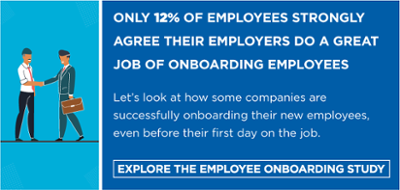
Only 12% of employees agree that their organization does a good job with employee onboarding — a process where new hires acquire the necessary skills and knowledge in order to become effective and efficient employees.
When it comes to onboarding employees, first impressions last forever. It's your opportunity to introduce the company's mission, value and personality. If you fail to fully communicate everything a new hire needs to know, they’ll likely leave the company. 26% of American workers have quit a job simply because they were unsatisfied with either the training or the onboarding process.
To retain quality employees and maximize their productivity, it's imperative that you take the onboarding process seriously. Make your new hires feel welcome in your company by properly discussing their new roles, the company's mission and vision, and everything else they need to know.
Planning is Key
 Too many new sales hires have a rough start or flame after a few months because they are in front of customers and prospects too soon. There are a number of driving forces behind these premature launches:
Too many new sales hires have a rough start or flame after a few months because they are in front of customers and prospects too soon. There are a number of driving forces behind these premature launches:
- Talented salespeople like to sell and want to get in front of real people ASAP, so they tend to rush out too soon.
- Managers are anxious to get a new seller on street sooner rather than later to recoup their investment in salary and guarantees.
- Managers assume the most important thing to do get someone ready to sell is cram their heads full of product knowledge — and then turn them loose.
So, if you really want to prepare your new hire to be successful what are the areas in which they should be certified before launch?
1. Product Knowledge
OK, we’ll be the first to admit they do need to know what they selling. I’ve heard customers and prospects comment over the years that “I know more about their products than they do” and that is no way to establish credibility. So, yes, they do need to understand your range of products and services, so you and they are not embarrassed.
2. Problems Your Products Solve
It’s not enough to know the headlines and details about your products. New sellers should also understand what kinds of problems each of your products solve.
After all, a competent seller will make decisions at various points in the sales process about which of your products and services would be applicable based on the needs they are hearing. That means your new salesperson has to understand what problems are solved by various products you offer and eventually build those into a bespoke solution.
3. Sales Process
Hopefully, you have a consistent sales process you teach all of your salespeople. Your new hires need to know it, understand it, practice applying it, and then use it when they get out in the field.
We teach six steps in our Sales Accelerator process – Identify, Connect, Discover, Advise, Close, and Grow.
Everything a new (or veteran) seller needs to do is included in these steps and a consistent sales process gives your new hire a GPS to follow in approaching customers and prospects and assures they will make consistent progress if they follow roadmap. You don’t want your new hire out there free-lancing with a sales approach that is ineffective or inconsistent with the mission of your organization.
4. Priority Setting System
Time is a precious commodity and those who are successful near term and long term know when and where to invest their time and energy. Most people work very hard but if their efforts are not focused on retaining and growing their largest clients (Key Accounts) or on developing prospects who have the potential to become Key Accounts they will likely fail.
They need to have a plan to spend time with high priority customers and prospects and limit their time with smaller accounts.
5. Customer Knowledge
This part gets ignored a lot, and what a shame. The best thing you can do with a new seller is send them out to interview four or five of your best customers so they can learn first hand what your clients value about your company, your products, and how you do business.
Who to better tell them than your customers themselves? They get practice setting appointments, asking questions, and they can give a report back to the sales team on what they learned.
Further, given Google, LinkedIn, Facebook, and a prospect’s website learning about the people and the companies they will be calling on is not that difficult. But you need to show them how to do and make sure they do it.
Onboarding Steps for Managers
1. Prepare all the documents that the new hire needs to sign: the job offer and the legal documents. Schedule medical visit, if applicable.
2. Ensure that all resources are ready for distribution. Create a new version if there are updates that need to be included.
Docs you need to prepare:
- Detailed Job Description
- Employee Handbook
- Dress Code
- Government Policies
- Insurance Information
- Bank Details
- Incentives and Rewards (if there any)
You may need more depending on the nature of work and the industry you're in.
3. If they're working remotely, make sure that you have informed them of what applications you'll be using. Provide them with the logins ahead of time. For physical onboarding, set up their desk and computer at least a few days before the onboarding.
4. Inform relevant departments of the new hires' schedules and what needs to be discussed with them. Ask them to prepare a detailed presentation of all relevant information that the new hire needs to know.
Everything should be discussed in detail and provide a copy of the presentation to the new hires for reference.
5. Send an email about the new hires to everyone involved. Copy them in the email so they feel welcome. If possible, schedule an employee tour or a meet and greet with the different departments.
6. On their first day, warmly welcome the new hires. Introduce them to your brand and include relevant information about the company include the organization chart.
Discuss their job description and why they were chosen to be part of the family. Inform them that their skills are valuable to the team and it will contribute to the company's primary objectives. Encourage them to be proactive employees and make them feel that their opinions matter.
7. Assign them to a mentor or a team leader. Make sure they know who to contact should they have any questions or clarifications.
8. Talk to the new hires about important procedures and standards. Ensure they are aware of the rules and regulations for breaks, internet usage, communication, etc. Introduce the new hires to the company's culture and discuss the incentives, if there are any.
9. After walking them through the entire process, get them ready for training. Don't forget to ask for their expectations of the company so you would know they also want from you.
10. Make sure that they have the tools they need during the training: pens, laptops, business cards, etc.
11. Don't forget to follow up with them after a week. Ask if they are comfortable and already settled in.
12. If possible, sit down with them once every month to find out if they are still comfortable with the work environment and the team members. Always listen to your new hires so they feel valued as employees.
Retaining the Best Talents
The onboarding process is a crucial step to keeping your best employees.
Established companies usually have a structured onboarding process. The key to exceptional employee onboarding is when all departments are able to carry out the structured plan.
Keep in mind that it's not enough to just provide information to your new hires. It's essential that you make them feel part of your company. Give them support and encourage them to take part in company activities. Employees are more likely to stay in the company when they belong.
Communicate often and get them involved as much as possible. Also, encourage them to create goals for themselves and celebrate small wins. Most importantly, don't forget to give them feedback. Let them know of their contributions to the company and that you are grateful for them.
Many companies have a certification process that focuses largely or solely on item number one. Certify your new hires in all five of the areas mentioned above and watch your retention rate and sales go up.




